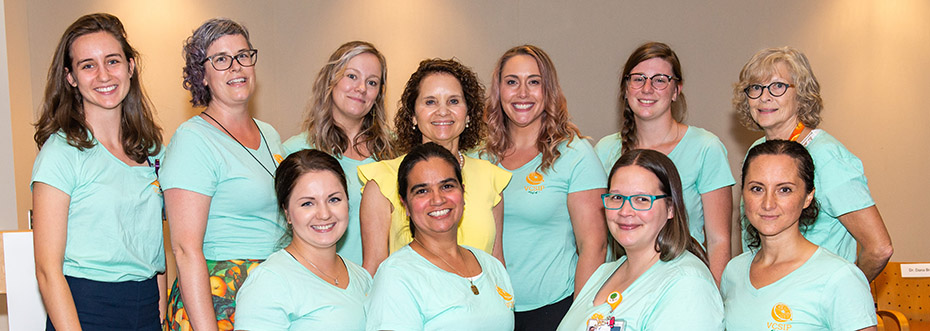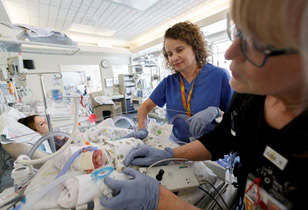Cindy McEvoy Pediatric Research Lab

Lung function trajectories

An individual follows along a lung function percentile that is established very early in life. Dr. McEvoy’s research focuses on in-utero and early life interventions designed to maximize fetal lung development and childhood pulmonary function in the face of adverse factors, including maternal nicotine use, maternal obesity, and prematurity. Her research is accomplished through translational randomized clinical trials and collaborative non-human primate studies. Dr. McEvoy has expertise in infant pulmonary function testing, and runs one of the few laboratories across the country that can measure infant pulmonary function to quantify response to both research and clinical treatment interventions. She is also investigating the ability of the non-invasive therapy of continuous positive airway pressure to stimulate lung growth in a randomized trial in premature infants and in a premature primate model.
Dr. McEvoy fosters diverse and robust collaborations between neonatology, obstetrics, pediatric pulmonology, investigators at the Oregon National Primate Research Center and adult pulmonologists to develop primary prevention interventions to decrease childhood and potentially adult lung disease.
Can In-utero and early life interventions reset lung function trajectories?

Dr. McEvoy has completed two separate randomized double-blinded trials of vitamin C supplementation to pregnant women unable to quit smoking that showed significantly improved pulmonary function tests and decreased wheezing in infants born to the mothers randomized to receive vitamin C during gestation. With her collaborators at the Oregon National Primate Center she also demonstrated the importance of nicotinic receptor genotypes and epigenetic changes in the response to vitamin C. Vitamin C supplementation to pregnant smokers may be a safe, inexpensive and simple measure with great public health significance to improve childhood respiratory health globally.
Environmental Children’s Health Outcomes Collaborative

Dr. McEvoy is also the PI of two longitudinal cohorts included in the ECHO (Environmental Children's Health Outcomes) collaborative of over 50,000 children investigating the effect of a variety of environmental factors on childhood health outcomes. The ECHO mission is the enhance the health of children for generations to come and to accomplish this, the ECHO is studying a broad range of early environmental exposures, from society to biology, and how they impact health outcomes throughout childhood and adolescence. This collaborative is focused on five key pediatric outcome areas: prenatal, perinatal and postnatal outcomes; upper and lower airway; obesity and obesity trajectories; neurodevelopment, and positive child health as a whole.

Dr. McEvoy has an active clinical and translational research program related to factors that may mitigate the effects of perinatal origins of lung disease. She is the Director of Maternal Child Health Research, Pediatric Department; Director of Research for Division of Neonatology; Credit Unions for Kids Professor in Pediatric Research at OHSU. She mentors many junior faculty and other students.
Primary investigator
-
- Cindy McEvoy, M.D., M.C.R.
- Credit Unions for Kids Professor of Pediatric Research